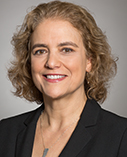
Karen I. Goldberg
University of Pennsylvania
|
Primary Section: 14, Chemistry Membership Type:
Member
(elected 2018)
|
Biosketch
Karen Goldberg is an inorganic chemist whose research interests are in the areas of mechanistic organometallic chemistry and catalysis. Her detailed studies of the mechanisms of fundamental organometallic reactions are informing the rational design and optimization of catalysts for important transformations that will provide new routes to produce fuels and commodity chemicals. Goldberg graduated from Barnard College of Columbia University (A.B) and then went on to obtain a Ph.D. from the University of California, Berkeley. Following postdoctoral study at The Ohio State University, she was a faculty member at Illinois State University (1989-1995) and the University of Washington (1995-2017). In 2017, she joined the University of Pennsylvania as Vagelos Professor of Energy Research. She served as Director of the first Phase II National Science Foundation Center for Chemical Innovation, the Center for Enabling New Technologies through Catalysis (2007-2018) and is presently the inaugural Director of the Vagelos Institute for Energy Science and Technology.
Research Interests
Research in Karen Goldberg’s laboratory is focused on mechanistic organometallic chemistry with the goal of developing new catalytic methods to efficiently produce chemicals and fuels from abundant feedstocks. Goldberg and her team study the mechanisms of fundamental reactions involving transition metal complexes to learn how different systems can cleave and form specific bonds. This understanding then guides the selection of specific metals, ligands, solvents and reaction conditions to achieve high catalytic activity and selectivity for desirable transformations of organic substrates. Using this strategy, Goldberg and her team are developing new catalytic systems to enable efficient, environmentally and economically sustainable technologies for the conversion of available resources such as natural gas, carbon dioxide and biomass to more valuable chemicals.

